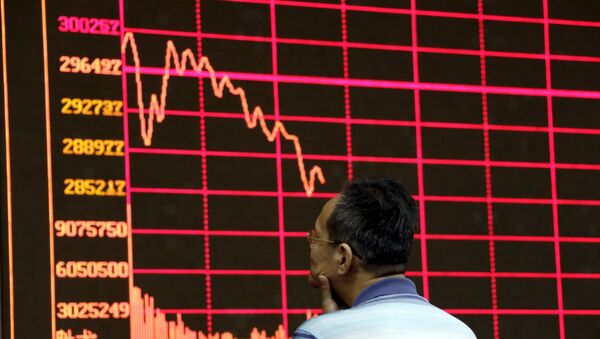Kristian Rouz — Marking the tenth anniversary of the beginning of the most recent global recession, several British and American policymakers have warned that the next major crisis in the world economy could be just around the corner.
Former British Prime Minister Gordon Brown said the world might be ‘sleepwalking' into another recession due to weak global leadership in the sphere of economics and finance. Brown stressed that multinational corporations, national governments, and supranational institutions haven't learnt the lessons of 2008, underscoring the need to effectively tackle threats to the economy.
"There is going to have to be a severe awakening to the escalation of risks, but we are in a leaderless world," Brown, who was at the helm of the UK's political governance during the meltdown of 2008 and 2009, said.
He also said the world economy is gradually moving toward a period of greater fragility and volatility due to a combination of emerging new risks and unresolved old ones.
READ MORE: India Poised to Surpass UK's Economy in Next One Year — Finance Minister
Brown highlighted the importance of the G20 format — which he co-founded — in overcoming the most acute stage of the crisis back in 2008, but international institutions mean so much less these days, he said.
"The cooperation that was seen in 2008 would not be possible in a post-2018 crisis, both in terms of central banks and governments working together. We would have a blame-sharing exercise rather than solving the problem," the former Prime Minister said.
However, a more relevant figure in contemporary economic policy-making, British Chancellor of the Exchequer Philip Hammond, also warned of the mounting risks to global financial sustainability. Hammond said the downside effects of the past few crises, the global recession of 2008-2009 and the European debt crisis of the early 2010s, still linger.
"People are still suffering the effects" of the past economic shocks, Hammond said in his recent BBC interview. However, he said there is "light at the end of the tunnel."
The Chancellor said rising UK wages and falling unemployment will support an expansion in the services sector, meaning Britain is currently not facing a threat of an economic downturn. However, Hammond admitted the UK is doing better than other countries — which might pose a major challenge.
"We have got through this in much better shape than many of our neighbors," Hammond said. But "if we want to see sustainable rises in living standards and real wages, we have to address the productivity challenge," the Chancellor added.
Hammond said a major problem for both the UK and many other countries is their high exposure to borrowing and debt. Many nations have accumulated a huge burden of governmental, private, and ‘hidden' debt over the past 10 years to get over the disastrous effects of the 2008-2009 meltdown.
READ MORE: Berlin, Paris Eye Fiscal Tool to Sidestep US Sanctions — French Finance Minister
Hammond says it's time these nations addressed this issue by improving their fiscal performance and discipline.
"We do have to get our debt down… (the) £50bn a year of money that we could be spending on schools and hospitals and police forces, is being paid out in interest on the debt," Hammond stressed. "Secondly, having a debt that is this high, 85% of our GDP, reduces our ability to respond to another shock to the economy, another recession."
Bernanke said commercial banks, facing a wall of non-performing loans (NPL) and a lack of central bank financing due to relatively high-interest rates back in 2007-08, made a series of wrong decisions. He said high levels of household debt and the dysfunctional mortgage market contributed to the unfavorable banking sector environment.
These two major concerns are still relevant today, despite financial sector regulations having improved over the past 10 years.
"These results do not rule out important effects through each of the identified channels, including channels linked to household balance sheets, but they do highlight the central role of the panic in setting off the Great Recession," Bernanke said.
The former Fed Chair also stressed that governmental interventions appear to be a necessary ‘firefighting' tool during the onset of a recession. However, policy interventions have a limited scope of impact and raise the probability of bad policy mistakes, which could only make the situation worse.
Bernanke also warned against excessive regulation of the financial sector, saying it could impair "the discount window and other lending facilities to the point that they might prove useless in a crisis."






